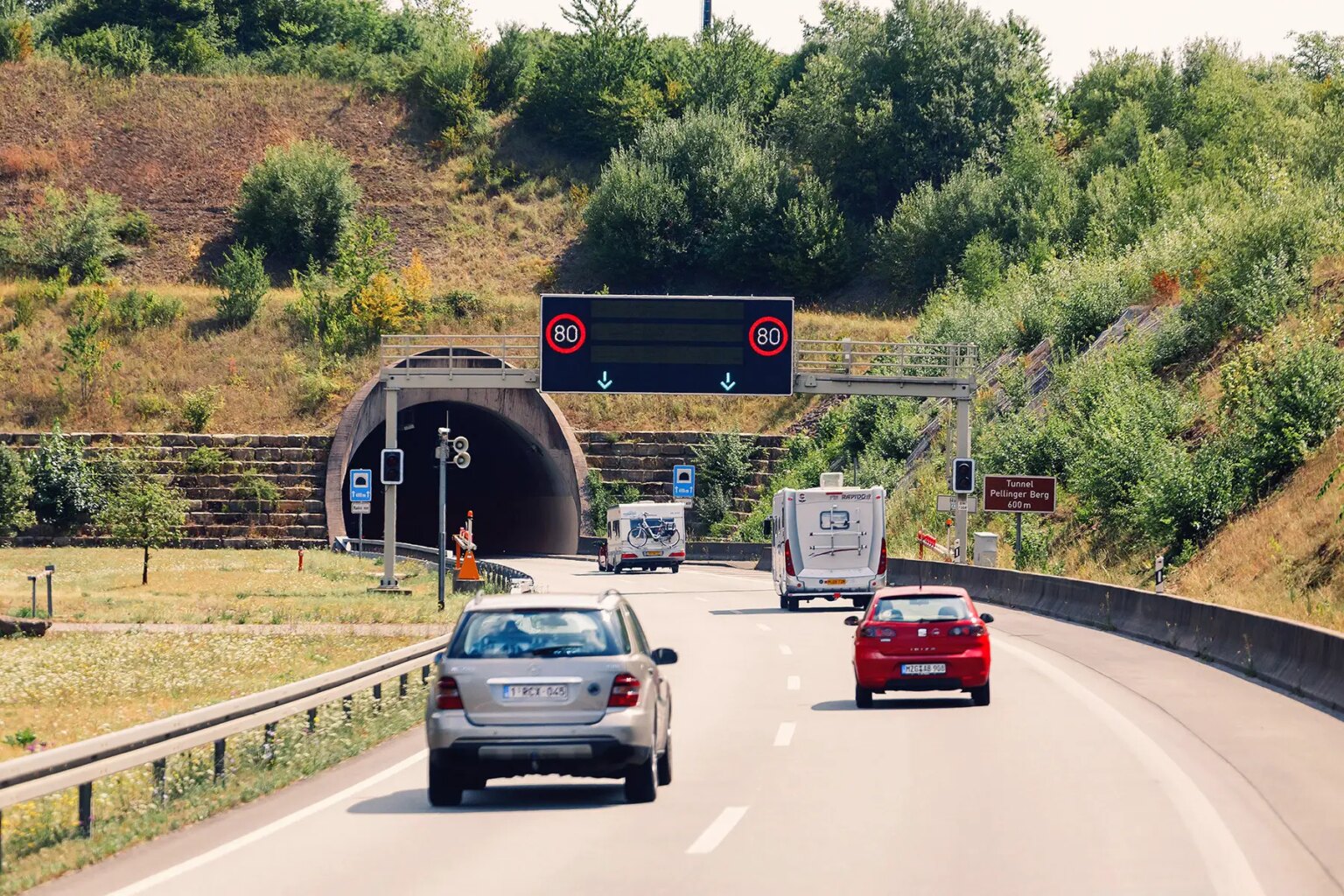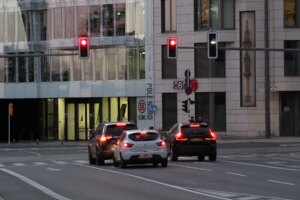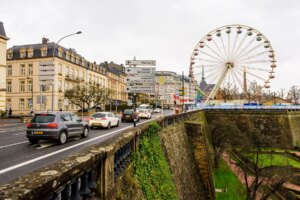Driving in Luxembourg has its benefits, like a good network of motorways and secondary roads that offer easy access. But there are other points to consider when driving in Luxembourg, especially when it comes to your car.
If you want to import your car into Luxembourg, there are guidelines to follow, such as customs and insurance procedures. The car also requires an examination for roadworthiness. You also must apply for a parking permit (vignette de stationnement). A lot of information is online at the Ministry of Transport’s website at www.snct.lu.
Here are some topics to consider:
- Car registration in Luxembourg
- Car maintenance in Luxembourg
- Road rules in Luxembourg
- Traffic offenses in Luxembourg
- Parking your car in Luxembourg
- Car rental and car sharing in Luxembourg
- Road support and car insurance in Luxembourg
- Accident in Luxembourg: What to do
- Motorcycles
- Fuel
- Road safety in Luxembourg
- Useful vocabulary (French – German)
Car registration in Luxembourg
Anyone buying a new car in Luxembourg from a dealership will have their registration process covered by the car dealer. They need your name and address of your car insurance company. They also require a certificate of residence from the last month at your local commune.
If you are buying a car from a private party, be sure to complete a contract of sale that includes the following: buyer and seller’s name and address, identity of the vehicle (make, model, mileage, chassis number), the vehicle condition, sale price and signatures of both parties. This will be essential proof when registering the vehicle.
It is the seller’s responsibility to notify the Ministry of Transport of the vehicle’s change of ownership, via post and in writing, within two weeks of the sale, by a filled form (declaration de mise hors circulation), proof of sale (document-facture) and parts one and two of the registration document (document d’immatriculation) to the Societe Nationaale de Controle Technique (SNCT), BP23, L-5201 Sandweiler.
The registration process
Once this happens, the new owner must go in person to the SNCT to register their new vehicle. Bring the following:
- Proof of sale (document-facture)
- Proof of valid car insurance from a Luxembourg registered insurance company
- A valid ID
- A double-sided photocopy of the seller’s proof of identity
- The previous registration documents, given by the seller
- A Vehicle Transaction request form (Demande de Transaction Automobile) from the SNCT
- Tax stamp (Timbre de Chancellerie), available from the SNCT or the Administration de l’enregistrement et des domaines
Here are the Societe Nationaale de Controle Technique (SNCT) Offices in Luxembourg, find the one that is closest to you, or you can call: Tel. 35 72 14-500
- Centre: 11 rue de Luxembourg, L-5230 Sandweiler
- South: 22-28 rue Jos. Keffer, L-4176 Esch-sur-Alzette
- North: 1 route de Pintsch, L-9776 Wilwerwiltz
Once your vehicle application is granted permission for registration you will receive a registration paper (‘carte grise’), a control certificate, an expiration date, and a pink registration badge that will be replaced with a grey stamp once your payment is sent in the following days. The grey stamp is your official registration badge, and it is valid for one year.
If you buy a car with exported or temporary plates, the car dealer should arrange permanent plates for you. If you want a personalized license plate, or the seller wants to keep their original license plate, the buyer needs to request a new plate number at the SNCT.
Car maintenance in Luxembourg
All cars in Luxembourg must pass an inspections test to be sure it meets safety and emissions requirements yearly. This might seem like a hassle, but EU emission regulations are tough and strict for environmental reasons. If you purchase a new car then a test is not necessary until four years later, then two years after that, then annually. Because your car is registered in Luxembourg, you will be sent a reminder via post about six weeks before the test is due each year. Walk-ins are possible, but to avoid a long wait it’s best to make an appointment.
At the test, make sure you have your vehicle registration, any previous road test certificate, proof of insurance, the tax sticker associated with your car, and the European certificate of conformity (Certificat de Conformite European). The test takes about an hour, and if passed you receive a new certificate valid for one year. If the vehicle fails, you receive a temporary pass for 21 days to make the proper reparations. Any auto that fails the test and says vehicule interdit a la circulation means the car is most likely unrepairable and must be towed.
Road rules in Luxembourg
National speed limits are 130 km/h on motorways (or 110 km/h in rain), 90 km/h on open country roads, and 50 km/h in built-up areas. The minimum driving age is 18 years and the blood alcohol limit is 0.5mg/ml. Driving in Luxembourg is on the right, with overtaking on the left.
The six motorways – all toll-free – cover 147 km in total, linking Luxembourg City with Trier (Germany), Thionville (France) and Arlon (Belgium) as well as with Esch-sur-Alzette and Ettelbruck in Luxembourg. It is important to note that traffic on the right has priority; the use of stop and yield signs is rarer than in some other countries (roundabouts are more common). Third-party insurance is compulsory and drivers should carry their driving license, vehicle registration and certificates of insurance, road tax card, and technical inspection.
Both front and rear seat belts are compulsory. Children under 12 years old (or under 1.5 meters tall) cannot travel in the front seat without a child restraint system. In the back seat, a proper restraint is necessary for children under three years. Children over three years old can use appropriate restraints but may only use the lap part of seat belts.
Traffic offenses in Luxembourg
Speeding and other traffic offenses are subject to heavy fines. Police impose on-the-spot fines, known as taxed warnings, varying from €24 for minor offenses up to €145 for major offenses. Ensure the officer collecting the fine issues an official receipt.
Parking your car in Luxembourg
Parking is scarce in Luxembourg City and Esch-Alzette. Most parking is not free, at pay-for car parks, parking meters, or parking ticket dispensers. Blue zone parking exists in major cities, for which a parking vignette must be obtained and displayed on the dashboard. Parking zones are divided by color, and each color represents a limited parking time. White zone parking is allowed for half an hour, orange a maximum of two hours, yellow three to five hours on the road and five to ten in a car park, green is a five-hour maximum and purple is a ten-hour maximum.
Alternatively, there are free park-n-ride car parks about three kilometers outside the city, from which regular buses leave for the city. Park-n-ride locations around Luxembourg City include Bouillon, Kockelscheuer, Luxembourg-Sud, Kirchberg, and Beggen.
Mopeds, motorbikes, and bicycles can usually find free parking areas. There are also free half-hour Park+Buy spaces in certain short-term parking shopping areas. In white and orange zones, there is free parking on Sundays, holidays, and between 6pm to 8am. If you live in Luxembourg with a parking permit for your town, you may park for free for two hours in any designated parking zone in Luxembourg.
Paying for parking in Luxembourg
There are a few ways to pay for parking in Luxembourg, either pre-paid permits, by paying with coins or credit. Many locals use the Call2Park (www.call2park.lu) designated park zones by registering an account online in advance. Users receive a badge for their car, and by simply texting the parking space number to Call2Park their account is charged for the duration used and the fee is directly withdrawal from their bank account.
Parking permits for the town or city where you live are available to place on your windscreen as a parking badge. A permit for the first car is free, but others will have to pay a fee and there is a limit of three per individual. There are annual permits, visitor permits (valid three months per year), and temporary permits valid for 20 days. To apply, you will need a copy of your car registration form, your resident identity card number (matricule), and a company certificate if it is a company car. When you’re ready to apply online or by post, visit the Service de la Circulation:
98 rue Auguste Charles, L-1326 Luxembourg
Tel: 47962312
Fax: 489248
Email: [email protected]
Wheel clamps are placed on illegally parked vehicles by Luxembourg’s numerous – and vigilant – traffic wardens, and vehicles parked on bus stops, pedestrian crossings, or spaces reserved for disabled persons will generally be towed away.
Car rental and car sharing in Luxembourg
To rent a car In Luxembourg, you must be at least 23 years old and have held your license for at least a year. Drivers under 25 may be subject to a surcharge.
Road support and car insurance in Luxembourg
Car insurance in Luxembourg is only applicable to residents who live in Luxembourg, although there are many insurance options to choose from in Luxembourg. If you have moved to Luxembourg with a car, it must be insured with a minimum of third party insurance to cover vehicle damage. Other insurance like theft, fire, and vandalism are options but can be covered in a comprehensive option called Assurance Casco. Once you receive the car insurance slip, called the green card (carte verte), it must be kept in your car at all times as proof of insurance. The third-party-insurance price depends on the car’s age and model, as well as the driver’s age and driving record.
Along with your proof of insurance will be an accident report sheet to keep together in your car at all times. In the case of an accident, this form (called constant) should be filled out and present to your insurance company within five to eight days of your report. The form will ask for the accident location, witness names, and the names of drivers involved including driver’s license details and insurance details from the other drivers. If the accident has to do with a parked car and the owner is absent, it’s customary to leave your name and contact details on a piece of paper on the window.
Sign up for the Automobile Club de Luxembourg (ACL) in case you run into car trouble in Luxembourg. The ACL auto association helps with roadside service in Luxembourg and with Luxembourg registered cars abroad.
Automobile Club de Luxembourg (ACL)
54 route de Longwy, L-8080 Bertrange
Tel: 45 00 45-1
www.acl.lu
Accident in Luxembourg: What to do
Accidents happen, and generally, the rule of thumb is to pull to the side carefully and stop in a safe place. If it is a two-car accident, only one constant form needs to be filled out, the other takes the connected carbon copy. Multiple cars mean each person fills out their own constant form. In any case, make the description as detailed as possible, include specifics and visuals if needed, and signatures. If any driver refuses to sign or fill their forms, take note of their license plate number and as much information as possible.
If there are injuries, call the following numbers:
Police: 113
Ambulance: 112
Motorcycles
The minimum age for driving a motorcycle is 18 years old. Motorcycle drivers and passengers must wear crash helmets. Children under 12 years old cannot travel on motorbikes. Use your headlights at all times.
Fuel
Fuel is much cheaper in Luxembourg than in the surrounding countries. All grades of unleaded petrol, diesel and LPG are available, as well as lead substitute additive. Leaded petrol is no longer available. Petrol stations are generally open from 7am to 8pm. Credit and debit cards are widely accepted at petrol stations, but not necessarily at automatic pumps, which are often the only pumps open out-of-hours. Carrying petrol in a can is legal.
Road safety in Luxembourg
All vehicles must be fitted with headlamp converters and it is compulsory for vehicles to carry a warning triangle and vest. Headlights are not necessary in clear daylight conditions except for motorbikes. A first aid kit, spare bulb kit, and fire extinguisher are also a good idea. The numbers for the emergency services are 112 (fire/ambulance) and 113 (police).
Useful vocabulary (French – German)
- driving licence: permis de conduire – Führerschein
- unleaded petrol: essence sans plomb – bleifreies Benzin
- diesel: diesel – Diesel
- entrance: entrée – eingang
- exit: sortie – Ausfahrt
- one way street: rue à sens unique – Einbahnstraße
- parking: parking – Parkplatz
- police: police – Polizei
- police station: commissariat de police – Polizeirevier
- toll: péage – Gebühren
- traffic warden: agent de police – Verkehrspolizist




